Odpadky a popelnice (v angličtině)
Vydáno dne 14.08.2024
Znáte slovní zásobu z oblasti odpadků a popelnic?
Odpadky a popelnice
Dnes se zaměříme na možná trochu zvláštní slovní zásobu, ale i toto patří k životu a mnoho slovíček můžete využít při každodenní konverzaci. Řeč bude o odpadcích a popelnicích.
Odpadky
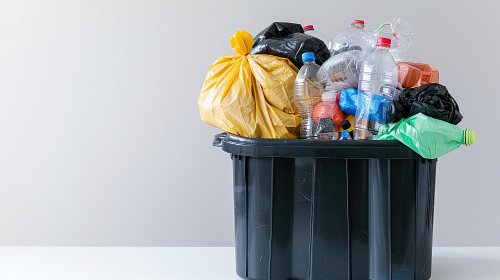
Začneme obecným slovem odpadky, odpad, pro které se používá slovo rubbish/'rʌbɪʃ/. Je to nepočitatelné podstatné jméno a patří do britské angličtiny.
Have you taken out the rubbish? *1
The park was covered in rubbish after the festival. *2
The council has introduced new rules for recycling and separating rubbish. *3
V americké angličtině používají pro odpadky slova garbage/'gɑ:bɪdʒ/ nebo trash/'træʃ/.
After the party, the kitchen was overflowing with garbage. *4
He had to dig through the garbage to find the receipt he accidentally threw away. *5
Don't forget to take out the trash before you leave for work. *6
I can't believe how much trash accumulates in the car over a week. *7
Tato slovíčka lze použít i přeneseně pro nesmysly, kecy, blbosti, brak nebo prostě nekvalitní věci.
She said his idea was complete
rubbish and refused to consider it. *8
The movie was absolute
rubbish. I wouldn't recommend it to anyone. *9
I can't believe he said that! What a load
of garbage! *10
He refused to eat at that restaurant again,
saying the food was trash. *11
Formálnější výraz pro odpadky, nebo spíše odpad, je waste/'weɪst/.
The factory is working on reducing the amount of waste it produces. *12
The company was fined for improperly disposing of hazardous waste. *13
She always tries to minimize waste by reusing and recycling as much as possible. *14
They installed compost bins to deal with organic waste from the kitchen. *15
The environmental group is raising awareness about the dangers of plastic waste in the oceans. *16
Značně formální je pak slovo refuse/'refju:s/ (pozor na výslovnost).
The city collects household refuse twice a week. *17
He was fined for illegally dumping refuse in a public park. *18
They sorted the refuse into different bins for recycling, composting, and landfill. *19
The refuse left behind after the music festival was cleaned up by volunteers. *20
Pozn.: Slovíčko refuse/rɪ'fju:z/ asi znáte jako sloveso odmítnout. Ovšem pozor – sloveso má přízvuk na druhé slabice, ale podstatné jméno na první, proto se mění i samotná výslovnost první slabiky. Více v článku Posun přízvuku (nouns/verbs).
Trochu jiný druh odpadků popisuje nepočitatelné podstatné jméno litter/'lɪtə/. Jde o odpadky, smetí, nepořádek, a to především ten, který je pohozen na ulici.
The only thing that spoiled the beautiful scenery was the litter that was lying around. *21
If you drop litter, you will be fined. *22
I didn't like the town. People were unfriendly and the streets were full of litter. *23
Slovo litter/'lɪtə/ lze použít i jako sloveso pohazovat odpadky, znečistit odpadky.
The place was littered with bottles and cans after the party. *24
I always say that people who litter are lazy. Even if there isn't a bin, you can take the bottles, cans or wrappers with you. *25
Zmínit můžeme i slovo junk/'dʒʌŋk/, což není odpad v pravém smyslu slova, jde spíše o harampádí, veteš, staré krámy.
The room was full of useless junk. *26
What is it? Do you want to keep it? – No, it's junk. Throw it away. *27
Odpadkový koš a popelnice
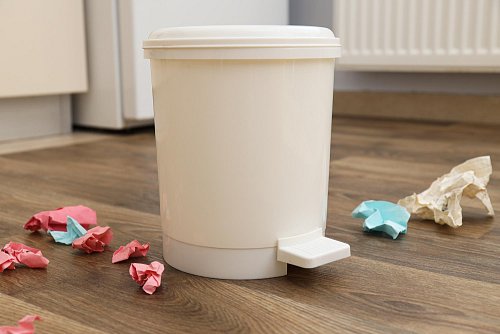
Odpadky vhazujeme do odpadkového koše a ten pak vysypeme do popelnice. Zde se opět trochu rozchází britská a americká angličtina. V britské angličtině používají pro odpadkový koš obecně slovíčko bin/'bɪn/.
Could you please throw this empty bottle in the bin? *28
I always keep a small bin under my desk for paper scraps. *29
He searched through the bin to find his missing keys. *30
Pozn.: Slovo bin ale může také popisovat jakoukoli nádobu, bednu (na uskladňování věcí).
Slovíčko bin/'bɪn/ lze ale použít i jako sloveso vyhodit do koše.
I decided to bin all the old magazines cluttering up the living room. *31
Instead of fixing the broken chair, they just binned it. *32
Setkat se můžete i s delšími výrazy rubbish bin/'rʌbɪʃˌbɪn/ a waste bin/'weɪstbɪn/ (případně wastebin nebo waste-bin). Ty ale mohou popisovat i odpadkový koš na ulici (viz níže).
We need to get a bigger rubbish bin for the office. This one fills up too quickly. *33
She dropped the used tissues into the waste bin. *34
Please make sure all the plastic bottles go in the recycling bin, not the waste bin. *35
Pozn.: Do odpadkového koše dáváme sáček, v angličtině bin bag nebo bin liner.
Pokud se jedná o odpadkový koš bez víka, určený hlavně do kanceláře, můžete vidět v britské angličtině i slovo wastepaper basket/ˌweɪst'peɪpəˌbɑ:skɪt/ (nebo waste-paper basket).
She crumpled up the letter and tossed it into the wastepaper basket. *36
I found my missing earring in the wastepaper basket by accident. *37
Pozn.: Takový kancelářský koš bez víka může být z plastu, ale taky může vypadat jako drátěný koš, proto slovo basket, který v základním významu znamená koš.
Pro popelnici mají v britské angličtině výraz dustbin/'dʌstbɪn/.
I noticed that someone had knocked over the dustbin, and rubbish was everywhere. *38
He lifted the lid of the dustbin and quickly closed it, holding his nose. *39
Please remember to take out the dustbin when you leave for work. *40
A jak je to v americké angličtině? Tam obecně nerozlišují odpadkový koš (který máte doma) od popelnice (kterou máte před domem). Nejčastěji se tam setkáte s výrazy trash can/'træʃkæn/ nebo garbage can/'gɑ:rbɪdʒ kæn/.
The smell from the garbage can was so bad that we had to take it out immediately. *41
The wind blew over the trash can, and the contents scattered everywhere. *42
V americké angličtině ale můžete vidět i slovo wastebasket/'weɪstˌbɑ:skɪt/, které popisuje otevřený odpadkový koš, hlavně na papíry a kancelářské odpadky (podobně jako britské slovo wastepaper basket).
He tossed the empty soda can into the wastebasket. *43
I accidentally dropped my pen into the wastebasket and had to fish it out. *44
Vrátit se ještě můžeme k americkému výrazu trash. Velmi často se totiž používá the trash ve spojení s odpadkovým košem či popelnicí. České “vyhodit to do koše” pak prostě přeložíme jako throw it in the trash (tedy vyhodit to do odpadků). České “v popelnici, v koši” pak lze přeložit jako in the trash.
She threw all the old magazines into the trash. *45
She found an old chair in the trash and decided to refurbish it. *46
After the move, we had a lot of broken items that we just had to throw in the trash. *47
He couldn't believe she had thrown his favorite book in the trash by mistake. *48
Odpadkový koš na veřejnosti
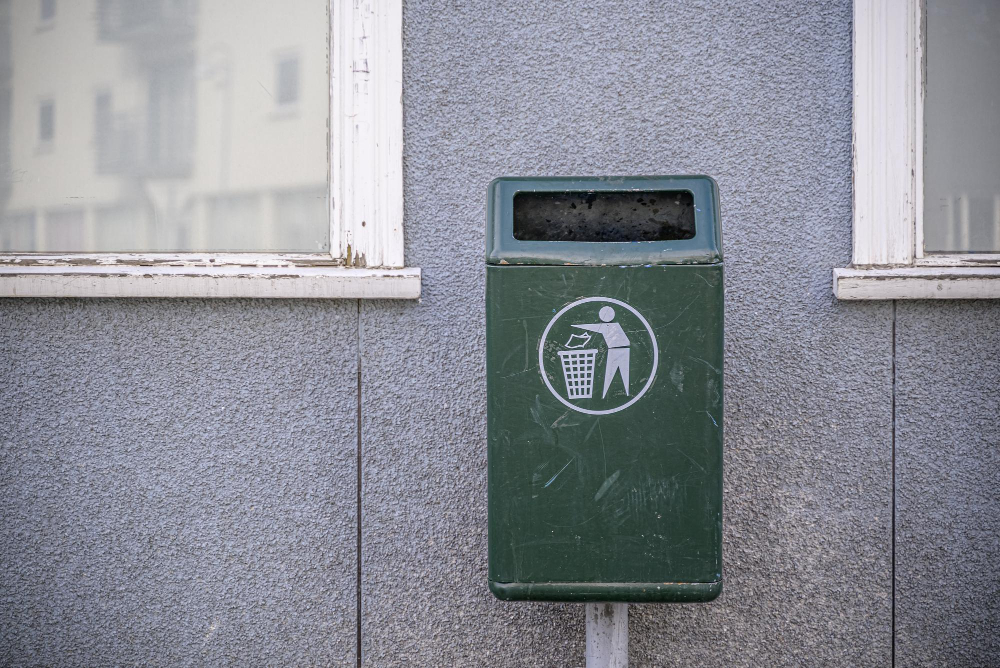
Jak jsme si již řekli, v britské angličtině používají pro odpadkový koš obecně slovo bin, případně rubbish bin nebo waste bin. Tyto výrazy mohou popisovat jak odpadkový koš doma, tak na ulici, v parku apod.
The park has plenty of rubbish bins, so there's no excuse to litter. *49
He kicked the rubbish bin in frustration when he missed the bus. *50
I saw someone leave their coffee cup on the bench instead of using the waste bin. *51
Pro odpadkový koš na ulici mohou Britové použít také slovo litter bin/'lɪtə bɪn/, případně litter basket/'lɪtəˌbɑ:skɪt/ (řekli jsme si, že litter popisuje pouliční odpad).
I saw someone drop their coffee cup right next to the litter bin instead of inside it. *52
The litter basket by the park bench was nearly full, but he managed to squeeze the bottle in. *53
V americké angličtině opět nerozlišují koš od popelnice, proto zde uslyšíte nejčastěji trash can nebo garbage can.
The park had garbage cans every few meters, but people still littered. *54
She tossed the ice cream wrapper into the trash can before heading to the bus stop. *55
Americké angličtině ovšem není úplně cizí ani slovo bin/'bɪn/, slyšet tam můžete také garbage bin, waste bin či trash bin – tyto výrazy opět mohou popisovat jak odpadkový koš (doma nebo na ulici), tak popelnici.
My neighbor always forgets to bring in
his garbage bins after collection day. *56
The trash bin in the
bathroom needs to be emptied, it's overflowing. *57
Kontejner na velkoobjemový odpad
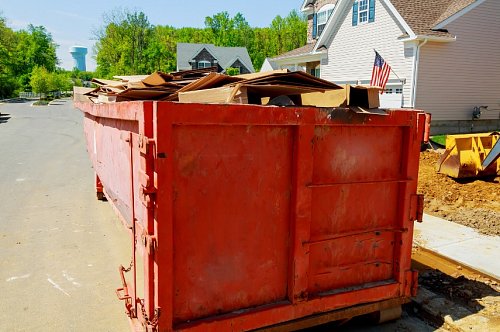
Zmínit je třeba i kontejner na velkoobjemový odpad. Nabízí se jistě slovíčko container/kən'teɪnə/, ale pozor, toto slovo označuje jakoukoli nádobu (nejčastěji plastovou s víkem). Stejné slovo pak popisuje přepravní kontejner (např. na lodi).
Ovšem toto slovo nepopisuje kontejner na ulici, kam odkládáte objemný odpad. Pro ten se používá v britské angličtině slovo skip/'skɪp/, v americké pak slovo Dumpster/'dʌmpstə/.
The construction site ordered a skip to collect the rubble. *58
The skip outside the building was overflowing with trash. *59
The Dumpster behind the restaurant is full of empty boxes. *60
We rented a Dumpster to clear out the garage over the weekend. *61
Pozn.: Velké D u slova Dumpster vysvětlujeme v článku Obchodní značky v angličtině.
Smetiště, skládka
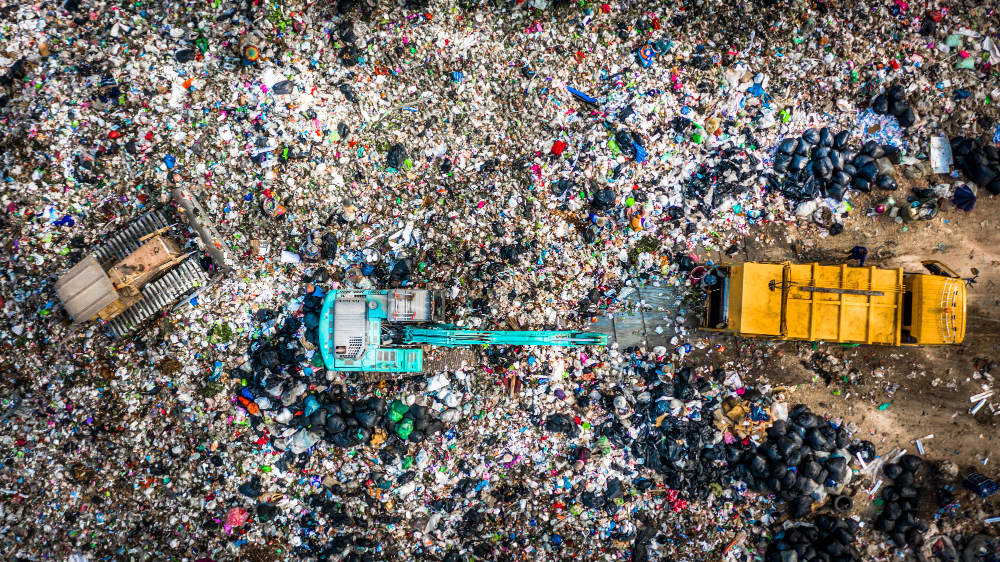
Pro smetiště či skládku v angličtině používají slovíčko dump/'dʌmp/.
After cleaning out the garage, we took a truckload of junk to the dump. *62
The company was fined for illegally using a field as a dump for toxic waste. *63
He found an old bike at the dump and decided to fix it up. *64
Pozn.: Slovíčko dump se používá i ve významu pohodit, odhodit nebo dokonce hovorově dát někomu kopačky.
V britské angličtině používají také delší rubbish dump, v americké pak garbage dump.
The smell from the rubbish dump was unbearable, even from a distance. *65
The city announced plans to convert the old garbage dump into a public park. *66
Dále máme slovíčko landfill/'lændfɪl/, což je zavážková skládka.
The new landfill is designed to handle waste more efficiently and reduce environmental impact. *67
They live near a landfill, so they often deal with unpleasant odours and noise. *68
Formálně se také můžete setkat s výrazem waste disposal site, což je skládka, nebo místo určené k likvidaci odpadu.
Popelář a popelářský vůz
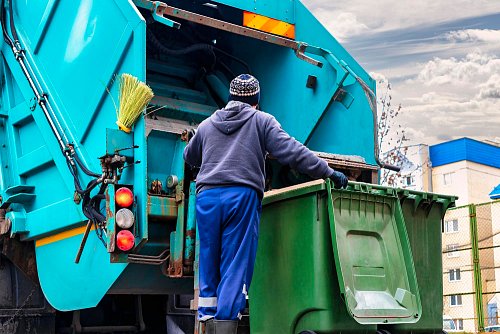
Dnešní článek uzavřeme překladem slovíčka popelář, což je v britské angličtině dustman/'dʌstmən/ (případně dustbin man), nebo formálněji refuse collector/'refju:s kə'lektə/. V americké uslyšíte garbage man/'gɑ:bɪdʒ ˌmæn/, nebo formálněji garbage collector/'gɑ:bɪdʒ kə'lektə/.
Many dustmen work in challenging conditions, especially during extreme weather. *69
The children were excited to see the garbage men and their truck in the street. *70
The city hired additional garbage collectors to manage the increased waste during the festival. *71
The refuse collectors went on strike, leaving the streets filled with trash. *72
K popelářům patří bezesporu popelářský vůz, což je v britské angličtině dustcart/'dʌstkɑ:t/ (případně dust cart), nebo rubbish truck/'rʌbɪʃˌtrʌk/. V posledních letech se hodně používá i slovo bin lorry/'bɪnˌlɒri/ (případně dustbin lorry).
The dustcart comes around every Thursday morning, so make sure you put the bins out the night before. *73
The noise of the rubbish truck woke me up earlier than usual today. *74
There was a small queue of cars behind the bin lorry, waiting for it to move out of the way. *75
V americké angličtině uslyšíte většinou spojení garbage truck/'gɑ:bɪdʒˌtrʌk/.
The garbage truck rumbled down the street early this morning, waking up half the neighborhood. *76
I had to run out in my pajamas because I forgot to put the trash out before the garbage truck came. *77
- Vynesl jsi ty odpadky?
- Park byl po festivalu zavalen odpadky.
- Rada zavedla nová pravidla pro recyklaci a třídění odpadu.
- Po večírku byla kuchyně plná odpadků.
- Musel se prohrabat odpadky, aby našel účtenku, kterou omylem vyhodil.
- Před odchodem do práce nezapomeňte vynést odpadky.
- Nemůžu uvěřit, kolik odpadků se v autě za týden nashromáždí.
- Řekla, že jeho nápad je naprostý nesmysl, a odmítla se jím zabývat.
- Ten film byl naprostá hovadina. Nikomu bych ho nedoporučil.
- Nemůžu uvěřit, že to řekl! To je ale blbost!
- Odmítl se v této restauraci znovu najíst, protože prý jídlo nestálo za nic.
- Továrna pracuje na snižování množství produkovaného odpadu.
- Společnosti byla uložena pokuta za nesprávnou likvidaci nebezpečného odpadu.
- Vždy se snaží minimalizovat množství odpadu tím, že jej co nejvíce využívá a recykluje.
- Instalovali kompostéry na organický odpad z kuchyně.
- Ekologická skupina zvyšuje povědomí o nebezpečí plastového odpadu v oceánech.
- Město provádí svoz domovního odpadu dvakrát týdně.
- Byla mu uložena pokuta za nedovolené odhazování odpadků ve veřejném parku.
- Odpad třídili do různých kontejnerů na recyklaci, kompostování a skládkování.
- Odpad, který po hudebním festivalu zůstal, uklidili dobrovolníci.
- Jediné, co tu nádhernou scenérii kazilo, byly odpadky, které se povalovaly kolem.
- Pokud budete pohazovat odpadky, dostanete pokutu.
- V tom městě se mi nelíbilo. Lidé byli nepříjemní a ulice byly plné odpadků.
- Po večírku bylo to místo zaneřáděno lahvemi a plechovkami.
- Vždycky říkám, že lidé, kteří pohazují odpadky, jsou líní. I když tam není koš, můžete si lahve, plechovky či obaly vzít s sebou.
- Ta místnost byla plná nepotřebného harampádí.
- Co je to? Chceš si to nechat? – Ne, je to veteš. Vyhoď to.
- Mohl byste prosím vyhodit tuto prázdnou láhev do koše?
- Pod stolem mám vždy malý koš na zbytky papíru.
- Prohledal koš, aby našel chybějící klíče.
- Rozhodla jsem se vyhodit všechny staré časopisy, které se povalovaly v obývacím pokoji.
- Místo aby rozbitou židli opravili, prostě ji vyhodili.
- Musíme si do kanceláře pořídit větší odpadkový koš. Tenhle se příliš rychle plní.
- Použité kapesníky hodila do odpadkového koše.
- Ujistěte se, že všechny plastové lahve jdou do koše na recyklaci, nikoli do koše na odpadky.
- Dopis zmačkala a hodila ho do koše.
- Ztracenou náušnici jsem náhodou našla v koši na odpadky.
- Všiml jsem si, že někdo převrhl odpadkový koš a všude byly odpadky.
- Zvedl víko odpadkového koše, rychle ho zavřel a držel se za nos.
- Při odchodu do práce nezapomeň prosím vyndat popelnici.
- Zápach z odpadkového koše byl tak silný, že jsme ho museli okamžitě vynést.
- Vítr převrátil popelnici a její obsah se rozsypal všude kolem.
- Vyhodil prázdnou plechovku od limonády do koše.
- Omylem mi spadlo pero do koše a musel jsem ho vylovit.
- Všechny staré časopisy vyhodila do koše.
- V popelnici našla starou židli a rozhodla se ji zrenovovat.
- Po stěhování jsme měli spoustu rozbitých věcí, které jsme prostě museli vyhodit do koše.
- Nemohl uvěřit, že jeho oblíbenou knihu omylem vyhodila do koše.
- V parku je spousta odpadkových košů, takže není důvod pohazovat odpadky po zemi.
- Když mu ujel autobus, naštvaně kopl do odpadkového koše.
- Viděl jsem, jak někdo nechal kelímek od kávy na lavičce, místo aby použil odpadkový koš.
- Viděl jsem, jak někdo odhodil kelímek s kávou hned vedle odpadkového koše, místo aby ho hodil do něj.
- Koš na odpadky u lavičky v parku byl téměř plný, ale podařilo se mu tam láhev vtěsnat.
- V parku byly každých pár metrů odpadkové koše, ale lidé stále odhazovali odpadky na zem.
- Než se vydala na autobusovou zastávku, vyhodila obal od zmrzliny do koše.
- Můj soused si po svozovém dni vždy zapomene popelnice zanést zpět dovnitř.
- Koš na odpadky v koupelně je třeba vysypat, je přeplněný.
- Na staveniště byl objednán velkoobjemový kontejner na svoz suti.
- Kontejner na velkoobjemový odpad před budovou byl přeplněný odpadky.
- Kontejner za restaurací je plný prázdných krabic.
- O víkendu jsme si pronajali kontejner na velkoobjemový odpad, abychom vyklidili garáž.
- Po úklidu garáže jsme odvezli náklaďák plný harampádí na skládku.
- Společnost byla pokutována za nezákonné využívání pole jako skládky toxického odpadu.
- Na skládce našel staré kolo a rozhodl se ho opravit.
- Zápach ze skládky odpadu byl nesnesitelný i na dálku.
- Město oznámilo plány na přeměnu staré skládky odpadků na veřejný park.
- Nová skládka je navržena tak, aby efektivněji zpracovávala odpad a snižovala dopad na životní prostředí.
- Žijí v blízkosti skládky, takže se často potýkají s nepříjemným zápachem a hlukem.
- Mnoho popelářů pracuje v náročných podmínkách, zejména za extrémního počasí.
- Děti byly nadšené, když v ulici viděly popeláře a jejich auto.
- Město najalo další popeláře, aby zvládli větší množství odpadu během festivalu.
- Popeláři stávkovali, takže ulice byly plné odpadků.
- Popelářský vůz přijíždí každý čtvrtek ráno, takže nezapomeň vynést popelnice večer předtím.
- Hluk popelářského vozu mě dnes probudil dříve než obvykle.
- Za popelářským vozem se vytvořila malá kolona aut, která čekala, až uhne z cesty.
- Dnes brzy ráno se ulicí prohnalo popelářské auto a probudilo polovinu sousedů.
- Musel jsem vyběhnout ven v pyžamu, protože jsem zapomněl vynést odpadky, než přijelo popelářské auto.